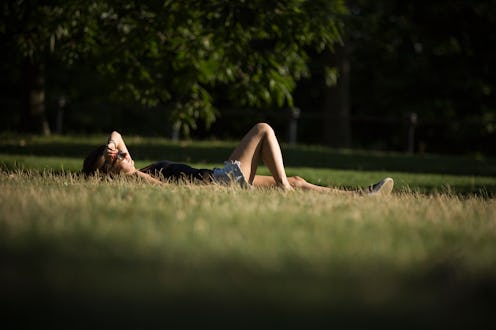Life
7 Signs Of Heat Exhaustion To Watch Out For In Young People

Summer is about soaking up all the sunshine and Vitamin D you can get before winter comes back with a seemingly never-ending vengeance. While you've already planned your beach trips and outdoor picnics, it's important to remember that there is such a thing as too much sun. Heat exhaustion and heat stroke — which is the more severe and life-threatening progression of heat exhaustion — are very real medical conditions that can put a serious damper on summer fun.
"Exertional heat illnesses, such as heat exhaustion and heat stroke, occur when the body faces an inability to remove heat more quickly than it is generated, such as during periods of strenuous exercise, especially in hot and humid environments," Dr. Gary Asher, the director of Integrative Medicine Services at the UNC Lineberger Comprehensive Cancer Center, explains to Bustle. He adds that while heat stroke is more common in elderly people, "anybody, under the right circumstances, is susceptible to heat illness," which can be dangerous or even fatal.
For younger people, heat exhaustion may not be brought on just by lying directly in the sun, but there are other circumstances that can trigger this medical condition. For example, even if you live a healthy lifestyle, exercising or working in the heat can quickly trigger heat stroke. Not to mention, while skimping on your air conditioning can help you save money during the summer, being stuck in a hot, stuffy apartment could also cause heat exhaustion.
Dr. Asher says people experiencing heat exhaustion can typically treat it at home without the help of medical professionals, and should "find a cool environment to rest, drink cool liquids, and apply cool towels or take a cool shower to help remove excess body heat." He explains that if heat exhaustion turns into heat stroke, it'll be marked by "the presence of higher body temperatures greater than 104 degrees Fahrenheit, and the presence of neurologic symptoms such as slurred speech, poor gait or coordination, or inappropriate behavior." If any of these symptoms are present, it's time to seek emergency medical care because heat stroke can be life-threatening."
If you plan on spending your summer outdoors, or even if you'll be inside a hot apartment, catching heat exhaustion before it progresses to heat stroke may save you a trip to the emergency room — though, if your symptoms don't abate after a few hours, it's important to see a doctor as soon as you can. These are eight signs of heat exhaustion in young people that you should be aware of.
1Headaches
People who suffer from chronic migraines or headaches find sunlight, glares, and heat can be common triggers for their symptoms. But, if you don't normally get headaches, the sudden onset of one could mean you are experiencing heat exhaustion. In fact, headaches are often one of the first signs your body is stressed from heat, so find somewhere to cool off right away.
2Dizziness Or Fainting
If you've ever felt faint or woozy after exercising in warm weather, or after standing up to quickly after a long time at the pool, you may be experiencing heat exhaustion. As the website for Australia's Department of Health and Human Services explained, "heat causes an increase in blood flow to the skin and pooling of blood in the legs, which can lead to a sudden drop in blood pressure."
3Goosebumps Or Flushed Skin
Typically, we associate getting goosebumps with being cold. However, the Mayo Clinic explained that your skin may feel flushed, and be covered in goosebumps during the first stages of heat exhaustion. Try to find some A/C and water ASAP if you notice this symptom.
4Nausea, Vomiting, Or Abdominal Cramping
Heat stress can turn your stomach, and cause symptoms like nausea, cramping, and vomiting even in the first stages of heat exhaustion, according to Johns Hopkins Medicine. This can be super unpleasant, so it's best to catch heat exhaustion if you can before you starting feeling the effects on your stomach.
5Excessive Sweating
As Healthline reported, "sweating profusely from many areas of the body" is a common sign of heat exhaustion. Of course, everyone has their own norm when it comes to how much they sweat. But if you notice you're sweating more than you usually do, and it isn't going away, make sure to get some cool water and head to the shade.
6Shallow Breathing
Another common symptom of heat exhaustion, according to Medical News Today, is shallow breathing. It may be subtle and hard to catch, but changes in your breathing may indicate the hot weather is becoming a bit too much for your body to handle.
7Anxiousness
Extended exposure to hot weather can make you feel anxious, as well as trigger your pulse to speed up. If you feel jittery, or notice your heart pounding a little faster when you don't typically deal with anxiety, or you haven't experienced any of your usual triggers, the heat could be to blame.
According to a report from the EPA, an estimated 9,000 people in the U.S. have died from heat-related causes between 1979 and 2014; that's way too many, considering heat stroke is preventable. If you know the symptoms of heat exhaustion, can recognize them, and then act fast, you can help avoid this medical condition that strikes in the summertime.